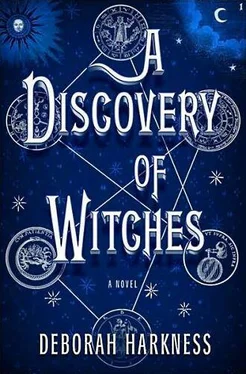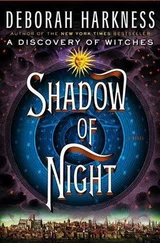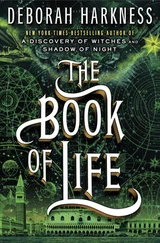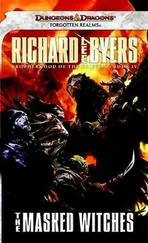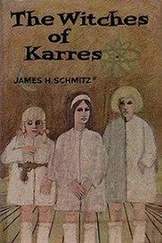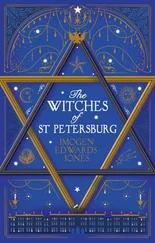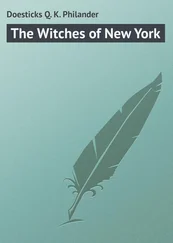“So where is it?”
“You’re already out of patience, I see.” He went to a shelf, his eyes darting among the volumes. He pulled out a small book with black tooled covers and presented it to me.
When I looked for a velveteen cradle to put it on, he laughed.
“Just open it, Diana. It’s not going to disintegrate.”
It felt strange to hold such a manuscript in my hands, trained as I was to think of them as rare, precious objects rather than reading material. Trying not to open the covers too wide and crack the binding, I peeked inside. An explosion of bright colors, gold, and silver leaped out.
“Oh,” I breathed. The other copies I’d seen of Aurora Consurgens were not nearly so fine. “It’s beautiful. Do you know who did the illuminations?”
“A woman named Bourgot Le Noir. She was quite popular in Paris in the middle of the fourteenth century.” Matthew took the book from me and opened it fully. “There. Now you can see it properly.”
The first illumination showed a queen standing on a small hill, sheltering seven small creatures inside her outspread cloak. Delicate vines framed the image, twisting and turning their way across the vellum. Here and there, buds burst into flowers, and birds sat on the branches. In the afternoon light, the queen’s embroidered golden dress glowed against a brilliant vermilion background. At the bottom of the page, a man in a black robe sat atop a shield that bore a coat of arms in black and silver. The man’s attention was directed at the queen, a rapt expression on his face and his hands raised in supplication.
“Nobody is going to believe this. An unknown copy of Aurora Consurgens—with illuminations by a woman?” I shook my head in amazement. “How will I cite it?”
“I’ll loan the manuscript to the Beinecke Library for a year, if that helps. Anonymously, of course. As for Bourgot, the experts will say it’s her father’s work. But it’s all hers. We probably have the receipt for it somewhere,” Matthew said vaguely, looking around. “I’ll ask Ysabeau where Godfrey’s things are.”
“Godfrey?” The unfamiliar coat of arms featured a fleur-de-lis, surrounded by a snake with its tail in its mouth.
“My brother.” The vagueness left his voice, and his face darkened. “He died in 1668, fighting in one of Louis XIV’s infernal wars.” Closing the manuscript gently, he put it on a nearby table. “I’ll take this up to my study later so you can look at it more closely. In the morning Ysabeau reads her newspapers here, but otherwise it sits empty. You’re welcome to browse the shelves whenever you like.”
With that promise he moved me through the salon and into the great hall. We stood by the table with the Chinese bowl, and he pointed out features of the room, including the old minstrels’ gallery, the trapdoor in the roof that had let the smoke out before the fireplaces and chimneys were constructed, and the entrance to the square watchtower overlooking the main approach to the château. That climb could wait until another day.
Matthew led me down to the lower ground floor, with its maze of store-rooms, wine cellars, kitchens, servants’ rooms, larders, and pantries. Marthe stepped out of one of the kitchens, flour covering her arms up to the elbows, and handed me a warm roll fresh from the oven. I munched on it as Matthew walked the corridors, pointing out the old purposes of every room—where the grain was stored, the venison hung, the cheese made.
“Vampires don’t eat anything,” I said, confused.
“No, but our tenants did. Marthe loves to cook.”
I promised to keep her busy. The roll was delicious, and the eggs had been perfect.
Our next stop was the gardens. Though we had descended a flight of stairs to get to the kitchens, we left the château at ground level. The gardens were straight out of the sixteenth century, with divided beds full of herbs and autumn vegetables. Rosebushes, some with a few lonely blooms remaining, filled the borders.
But the aroma that intrigued me wasn’t floral. I made a beeline for a low-slung building.
“Be careful, Diana,” he called, striding across the gravel, “Balthasar bites.”
“Which one is Balthasar?”
He rounded the stable entrance, an anxious look on his face. “The stallion using your spine as a scratching post,” Matthew replied tightly. I was standing with my back to a large, heavy-footed horse while a mastiff and a wolfhound circled my feet, sniffing me with interest.
“Oh, he won’t bite me.” The enormous Percheron maneuvered his head so he could rub his ears on my hip. “And who are these gentlemen?” I asked, ruffling the fur on the wolf hound’s neck while the mastiff tried to put my hand in his mouth.
“The hound is Fallon, and the mastiff is Hector.” Matthew snapped his fingers, and both dogs came running to his side, where they sat obediently and watched his face for further instructions. “Please step away from that horse.”
“Why? He’s fine.” Balthasar stamped the ground in agreement and pitched an ear back to look haughtily at Matthew.
“‘If the butterfly wings its way to the sweet light that attracts it, it’s only because it doesn’t know that the fire can consume it,’” Matthew murmured under his breath. “Balthasar is only fine until he gets bored. I’d like you to move away before he kicks the stall door down.”
“We’re making your master nervous, and he’s started reciting obscure bits of poetry written by mad Italian clerics. I’ll be back tomorrow with something sweet.” I turned and kissed Balthasar on the nose. He nickered, his hooves dancing with impatience.
Matthew tried to cover his surprise. “You recognized that?”
“Giordano Bruno. ‘If the thirsty stag runs to the brook, it’s only because he isn’t aware of the cruel bow,’” I continued. “‘If the unicorn runs to its chaste nest, it’s only because he doesn’t see the noose prepared for him.’”
“You know the work of the Nolan?” Matthew used the sixteenth-century mystic’s own way of referring to himself.
My eyes narrowed. Good God, had he known Bruno as well as Machiavelli ? Matthew seemed to have been attracted to every strange character who’d ever lived. “He was an early supporter of Copernicus, and I’m a historian of science. How do you know Bruno’s work?”
“I’m a great reader,” he said evasively.
“You knew him!” My tone was accusing. “Was he a daemon?”
“One who crossed the madness-genius divide rather too frequently, I’m afraid.”
“I should have known. He believed in extraterrestrial life and cursed his inquisitors on the way to the stake,” I said, shaking my head.
“Nevertheless, he understood the power of desire.”
I looked sharply at the vampire. “‘Desire urges me on, as fear bridles me.’ Did Bruno feature in your essay for All Souls?”
“A bit.” Matthew’s mouth flattened into a hard line. “Will you please come away from there? We can talk about philosophy another time.”
Other passages drifted through my mind. There was something else about Bruno’s work that might make Matthew think of him. He wrote about the goddess Diana.
I stepped away from the stall.
“Balthasar isn’t a pony,” Matthew warned, pulling my elbow.
“I can see that. But I could handle that horse.” Both the alchemical manuscript and the Italian philosopher vanished from my mind at the thought of such a challenge.
“You don’t ride as well?” Matthew asked in disbelief.
“I grew up in the country and have ridden since I was a child—dressage, jumping, everything.” Being on a horse was even more like flying than rowing was.
“We have other horses. Balthasar stays where he is,” he said firmly.
Читать дальше
